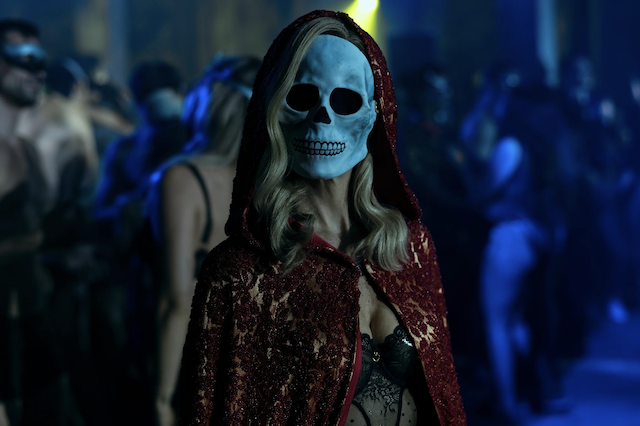
©Courtesy of Netflix
Contemplating with the fact that their choices and actions eventually incur life-altering consequences is a crippling realization for many people. That awareness is even more devastating for the wealthy, who don’t abide by the same rules as the lower classes until drastic repercussions start to catch up with them. That’s certainly the case for the anti-heroes in the gothic horror mini-series, The Fall of the House of Usher.
The television show is loosely based on various works by Edgar Allan Poe, most prominently the eponymous 1840 short story. The Fall of the House of Usher adapts several unrelated stories and characters by Poe into a single nonlinear narrative that’s set from 1953 to 2023.
The Fall of the House of Usher was created by Mike Flanagan, who also serves as one of the project’s directors with Michael Fimognari. Flanagan also served as a writer and an executive producer on the drama.
The Fall of the House of Usher follows Roderick Usher (Bruce Greenwood), the CEO of Fortunado Industries, a massive pharmaceutical conglomerate. Though he’s extremely successful in his career, he’s become stressed in his personal life, as all six of his children have died recently. As a result, the only remaining members of the Usher empire besides Roderick are his twin sister Madeline (Mary McDonnell), his granddaughter, Lenore (Kyliegh Curran), his new wife Juno (Ruth Codd) and the family consigliere Arthur Pym (Mark Hamill).
During the final funeral for his children, Roderick is frightened by the appearance of the mysterious Verna (Carla Gugino). As a result, he asks Assistant Attorney General C. Auguste Dupin (Carl Lumbly) to visit him in his childhood home so that he can confess his varied crimes. Dupin has spent most of his career pursuing the Ushers, but he’s never been able to successfully convict them.
Dupin, who’s eager to hear what Roderick has to say, encourages the businessman to start recounting his life from his childhood. The businessman’His youth is told in the series’ first of two timelines, from 1953 to 1980.
The second timeline reveals the truth behind the deaths of Roderick’s children: Frederick (Henry Thomas) and Tamerlane (Samantha Sloyan), who were born from the CEO’s marriage to his first wife, Annabel Lee (Katie Parker). Roderick also had four children out of wedlock, including PR mastermind Camille (Kate Siegel), video game tycoon Napoleon (Rahul Kohli), ambitious scientist Victorine (T’Nia Miller) and the party-loving Prospero (Sauriyan Sapkota). The second timeline follows all of the Ushers during the two weeks leading up to the discussion between Roderick and Dupin.
Flanagan, Gugino, Siegel and Kohli generously took the time to talk about helming and starring in the drama, to honor its one-year anniversary, during a panel at this month’s New York Comic Con. The Fall of the House of Usher‘s eight episodes are now all streaming on Netflix.
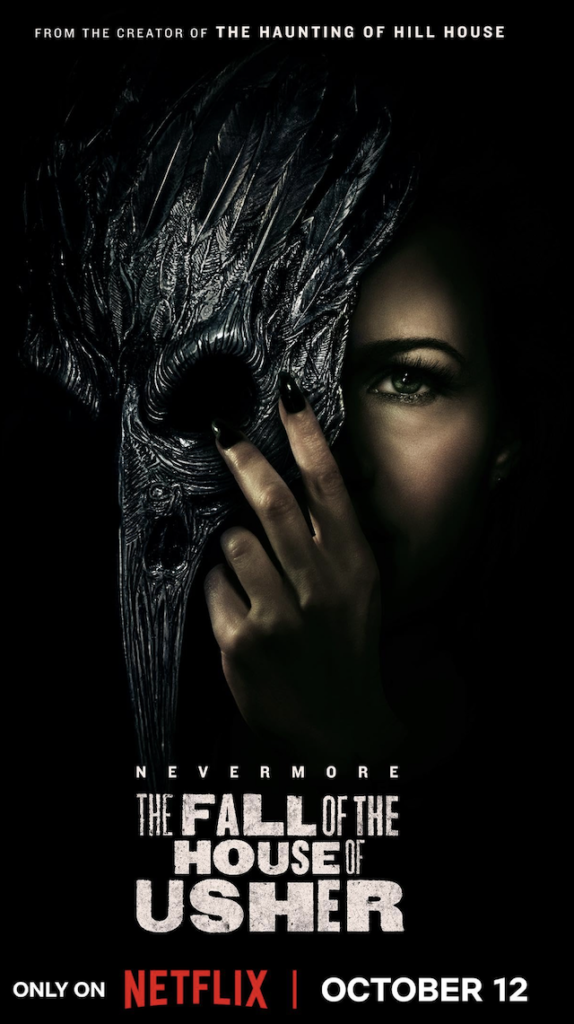
©Courtesy of Netflix
Q: Welcome, everyone to New York Comic Con and the panel for The Fall of the House of Usher! Do you all remember the first time you ever saw one of your characters cosplayed at a convention? It has to be a moment.
Carla Gugino: It is such a moment! The thing that blows my mind more than anything is the tattoos! I love that. I don’t know if it’s my deep wealth of vanity, but seeing my face on someone else’s body is exciting.
The overall energy of a convention is wholly unique. It’s so extraordinary to see everyone come out. I’ve lived so much of my life, since I was a little kid, on screen, so I feel like we’ve all lived it together. That’s a very special feeling.
I think the first time I saw one of my characters cosplayed was Sally Jupiter from Watchmen. It was a great costume!
Q: Are there different text threats for all of the projects you all work on together?
Kate Siegel: We can’t talk about this because Rahul is excluded from so many of them!
Rahul Kohli: I had a feeling I wasn’t in all of them!
Carla Gugino: It’s so funny because you’ll just drop a bomb of a joke that will just silence everyone as they slowly back away from their phone, imagining it will be read out loud at a deposition. (Audience laughs.)
Q: Mike, you’re one of the few filmmakers who continuously works with the same group of actors on almost all of your projects. How did that happen?
Mike Flanagan: It was not intentional. But I was very nervous when I first started to make movies, as I didn’t know what I was doing. I think most of us who make movies don’t know what we’re doing when we first start out, and we live in constant fear that others are going to figure that out.
But when you have people who you trust, it definitely helps build your confidence as a filmmaker. Making movies and TV shows is so difficult, and your time is so crazily spread out, that if you can communicate well with people, it just makes the process so much better. You have this baseline of trust that it becomes telepathic communication at a certain point.
With the people who I work with again and again, I just want them there with me on each new set, as it makes the day better.
The group of actors who I work with has grown organically. It initially wasn’t an intentional thing, but it has become one of my favorite things about working.
Q: Kate, one of the first collaborations you had with Mike was on Oculus. What struck you about his sensibilities as a filmmaker from the beginning?
Kate Siegel: One of the first times I ever performed for Mike was during an audition for another movie that never became a movie. For the record, I didn’t book the role because he didn’t cast me! (Audience laughs.)
Normally for these auditions, you prepare a huge amount of material; I think it was eight pages for this movie. If you’re lucky, they’ll put you through your paces. Usually, you run it once and they say, “Thank you.”
Mike ran it three times, giving me directions. It was a time in my career where I was feeling really despondent, and I was being led in and out like cattle without any success.
After I felt like I had run through all of my tricks and did my routine, Mike asked me, “Can you do one more?” I was ready to say, “Yes, anything you want from me!” But he said, “Just do one the way you want to do it. Just do it for you.” I almost burst into tears because it had been so long since I felt like my art had belonged to me.
I think that feeling is held by every one of us actors who stars in Mike’s films – that he truly wants us to own our art. That’s also true for everyone who works on the crew, from the sound design to camera work. Everyone owns their art and brings it to whatever the project is. So I was immediately addicted to working with him. Then I fell in love with him! (Siegel and Flanagan married in 2016.)
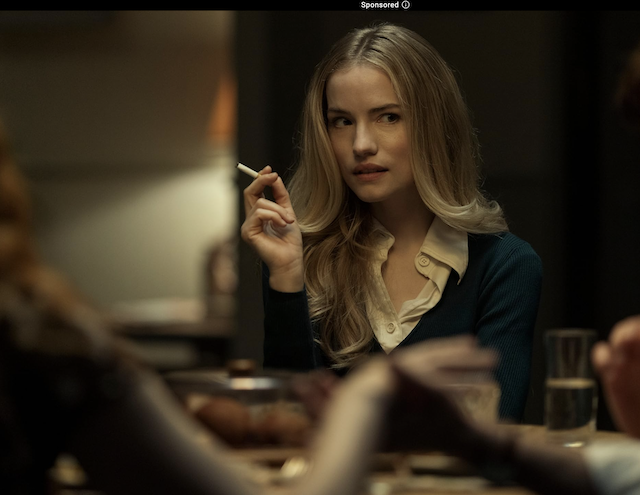
©Courtesy of Netflix
Q: Carla, your origin story with Mike was on Gerald’s Game. You gave a fantastic performance in one of the so-called unfilmable Stephen King novels that Mike has become known for adapting for the screen throughout his career. What do you recall about getting that role and the challenges on that project?
Carla Gugino: Well, it was an unusual circumstance because I had heard through my agents that Mike was interested in meeting about this movie that was going very quickly. There was a shortlist of people who he wanted to meet with, and I was one of them.
So I read the script and thought, wow, there’s no where to hide, both figuratively and literally. As you know, my character’s handcuffed to a bed in a negligee, and craziness ensues.
So I thought, I have to talk to this guy, as this adaptation is cool. But I would have to jump in extremely quickly and put myself in his hands.
So we ended up talking, but he didn’t tell me at the time that if production hadn’t come through very quickly, the movie would not have happened. But he played it very cool. We started talking when he was scouting in Mobile, Alabama, where we shot the movie. In about three minutes, I thought, I want to help this guy make this movie.
I gave him my innate trust very quickly, and I don’t know how that happened. We then instantly delved in.
It was only a two-week period from the moment that I first read the script to the moment that we started shooting. Bruce Greenwood was already cast, as was another actress who was cast in my role, but she had to drop out. I was then cast, and then we hit the ground running.
Bruce and I had dinner every night with our scripts in hand, running lines. We shot the movie almost like a one-act play; we shot it predominately in this one small location with a small crane that would follow us around. I would play the various Jessies in a row.
So it was an incredible experience that was was also challenging. But it was one of the most joyous times that I’ve ever had on a set. So it was a wild entry to working with Mike.
Mike Flanagan: I always say that Carla saved the movie. It wasn’t just that she came in and took the part and ran with it; she came in and reassured a crew that was panicked because we thought that the movie might not happen.
We were all incredibly stressed because we were taking this new, unknown element into the mix so quickly. Bruce was like, “This is someone who I don’t have a previous relationship with, so I have to get to know her right away. How is this going to work?”
But Carla came in and took everybody’s anxiety away on her first rehearsal day. Everyone relaxed and calmed down, as she took a leadership role in the movie. I knew in the first week that I wanted to work with her forever, and thus far, we have.
Carla Gugino: The feeling is mutual!
Q: Rahul, what was your origin into getting into working with Mike? Did you audition for (The Haunting of) Bly Manor?
Rahul Kohli: Yes, I did a tape. It was weird that that tape changed my life. It was a routine audition, as I had just finished shooting iZombie, and I didn’t know where the next show was coming from. When I received the script for Bly Manor, it just said Untitled Hill House Sequel. I did my audition with my mom, which was an experience. (Audience laughs.)
When they called me to tell me I had gotten the role of Owen Sharma, I was like, “Cool,” and was off to Vancouver, where we shot. Mike directed the pilot, and I felt that he was sizing me up within a few days into the production.
He was asking me questions, including about how old I thought I could play. I was like, oh, something’s happening! (Audience laughs.) He then started talking to me about Midnight Mass. (Audience claps.) So it started my collaboration with Mike really quietly.
I didn’t realize that what I was about to embark on was one of the most important journeys in my career. I’ve made friends for life.
Mike Flanagan: When we were on set for Bly Manor, we were in pre-production for Midnight Mass. So I was already looking at Rahul to also star in Midnight Mass off of his tape for Bly Manor. I thought he would be perfect to play Sheriff Hassan, but I wasn’t sure because I didn’t really know him yet.
There’s a scene in the pilot for Bly Manor where he’s unloading groceries in the kitchen. There was not much direction to give for this because he was just being his normal self putting away the groceries.
But I wanted to get a sense of who this guy really was because everyone behaves very differently than they normally do when they first show up on set; everyone’s being very proper and trying to make a good impression, especially on a pilot.
So I started making up very ridiculous directions on how to put away the groceries. I was like, “It’s very important that you start with the bananas.” (Audience laughs.) “I want you to take out the bananas with your left hand. With your right hand, I want you to take out the bread. I want you to take them out at the same time and place them on the counter.”
I saw him go, “Uh-huh, right.” Then he said, “You’re messing with me, right?” Then I was like, “Oh, we’re going to get along great!” (Audience laughs.)
Rahul Kohli: I didn’t know that! I thought it was just my talent that impressed you! But it was also the banter. (Audience laughs.)
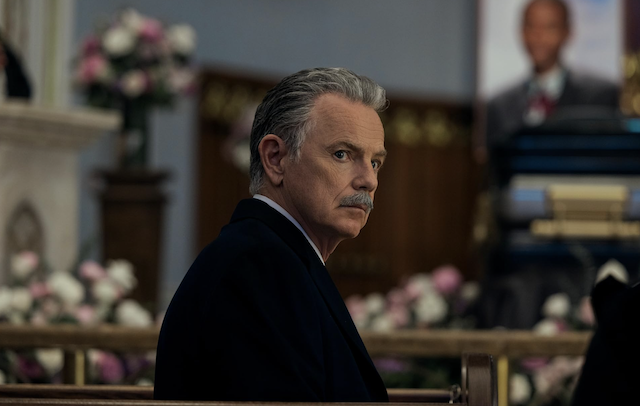
©Courtesy of Netflix
Q: If there is a common theme that recurs in your work, Mike, it’s messed up families, and that’s definitely true in The Fall of the House of Usher. How did the show come together? How did you work to give the story and the characters their own spin?
Mike Flanagan: I’ve wanted to adapt (Edgar Allan) Poe since I was a kid. To try to find a way to do Poe that I think hadn’t really been done before was a challenge that I wanted to take on…There are so many adaptions of his work, so how do you do something different?
With this project, we were developing it at a time when I think we had a lot to say about the country, including the wealth gap. So it seemed like a delicious opportunity to do something that was funny, dark, wicked and twisted.
It felt like different music than what we had been making. I think we had talked at one point about how (The Haunting of) Hill House is like classical music, (The Haunting of) Bly Manor is like a string quartet and The Fall of the House of Usher is rock-n-roll with a little heavy metal. I thought, this is really fun.
I remember on Midnight Mass already talking to the cast about the characters I thought they would play on The Fall of the House of Usher. I pulled them aside and asked them, “What do you think of this?” That was really fun for Carla because I was like, “What do you think about these nine versions?”
Q: What were the reaction the actors had to their characters for The Fall of the House of Usher?
Carla Gugino: It was wild for me because I only donated my voice for, but wasn’t actually on screen with the rest of the cast on, Midnight Mass. So I didn’t have a conversation with Mike about The Fall of the House of Usher on set of Midnight Mass.
So Mike called me and said, “I think I want to do Poe. Would you be interested in the raven? I think you’d be great as the raven.” I said, “Um, yes.” (Gugino laughs.) That was all I needed.
Then as he started writing the scripts, I started getting each one as soon as it was finished. So I didn’t get to binge it; I had to wait for each script, but he’s really fast…I was riveted by each script.
But then became terrified when I realized that I actually had to play the raven. (Gugino laughs.) I was like, “Oh, I have to pull this off or I’ll ruin the whole show.” So the experience was extraordinary.
Some of the iterations of Verna had very specific things written in them. But there weren’t any accents, so we were able to explore that together.
So I would go in and Mike would be in his office, and I would be like, “What do you think about this?” Then I would basically audition with an accent for one of the characters. I would say, “I think this person might be from the Midwest.”
For many of the iterations, I think we clicked in right away. But there was a moment when I initially thought our escort was a New Yorker…Mike was really supportive, but ultimately said, “I think this might not be her.” So I said, “Maybe she’s a Brit.” So in that moment, we immediately started playing with it.
That’s the amazing thing about being able to collaborate with someone with whom you have innate trust, and you know is an extremely strong leader. When an auteur, who has written, directed and edited a project, has ownership over it and has really strong perspective, they’re truly collaborative…So this was one of the most extraordinary experiences of my career.
To also be able to work with a cast that you respect and love is amazing. Kate is one of the most precise actors on the planet. It’s really extraordinary to watch her work.
Q: Kate and Rahul, are you ever surprised at the roles Mike approaches you with? You’re not cast in the same type of role in each project.
Kate Siegel: I think I struggled the most with was Erin Greene in Midnight Mass. What Mike wanted with Erin was the most private part of me. As a person, when I feel perceived, I immediately start running the jokes, so that the rest of it can still feel secret and safe.
Originally, it was Erin who burned up in the rowboat. But when Mike made that swap, he came up to me and said, “I think I want you to play Erin.” I was like, “Let’s be honest – I would be a fabulous Bev.” (Audience laughs.) “Or what about Lady Sheriff or Mother Paul?” (Audience laughs again.) I then started reading Erin, and saw how Mike saw me in that way.
Then on set, it was a daily exorcise in stripping away. I would say, “What about this?” He would say, “No.”
I think the best example of that was when Erin shoots Bev, and the line is, “And now we have five minutes.” I was like, “What about a close-up of me?” We went back and forth on that a lot because there’s a lot of Erin who didn’t know what to say, but knew there was supposed to be a rousing statement there. But the beauty of Erin is that she’s little moves.
Rahul Kohli: Before I signed on to play Sheriff Hassan in Midnight Mass, I was known for playing sweet boys, like Ravi on iZombie. So the sheriff was a nice change for me.
I was about 33 at the time we shot Midnight Mass, but the sheriff was supposed to be about 42, and he had a teenage son. Also, I don’t speak Arabic and I’m not Muslim, like the character is, and I’m not American (Kohli was born in England.)
So that character was a tough one for me, and I wrestled with it everyday. It was a character that was super contained. We always wanted him to simmer, and the way that shooting turned out, he didn’t boil over until the last week of shooting.
So for six months, I just felt like I was smoldering. I waited for a crew member to say, “Great scene.” But they never did because I just sat there. (Audience laughs.)
But that role changed me because I was terrified and super insecure. I didn’t feel like I proved myself with the role. But once the series came out and it received the reception that it did, it changed me. It also led me to trust Mike on a deeper level.
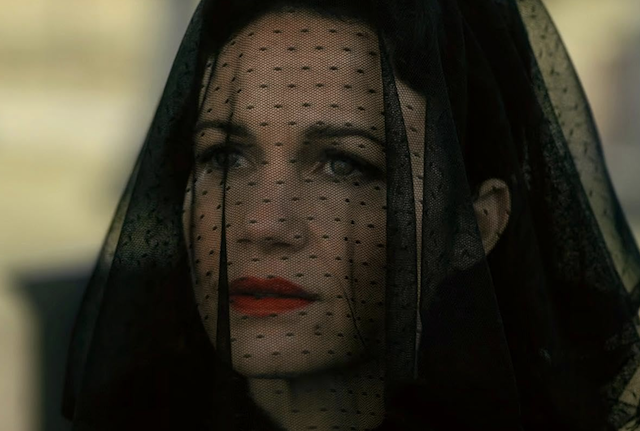
©Courtesy of Netflix
If you like the Q&A, share your thoughts below!
Check out more of Karen Benardello’s articles.
Here’s the trailer of the series.

